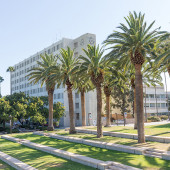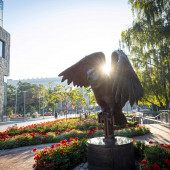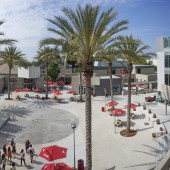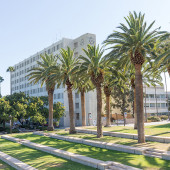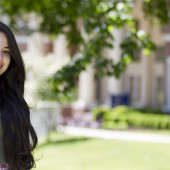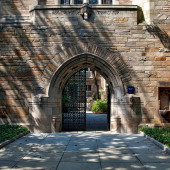South Korea is a highly developed and modern country with an excellent quality of living, vibrant culture and strong economy, containing some of the best universities in Asia at competitive prices.
Officially known as the Republic of Korea, South Korea is a country in East Asia that makes up the southern part of the Korean Peninsula and its adjacent islands, which are mostly mountainous and bare. Life on the mainland couldn’t be more different though, with half the population of South Korea living in a high-rise, and Seoul Capital Area being home to 25 million people in just 11,704 km2.
South Korea is known for its very high standard of living, being one of the world’s leading international financial centres and having Asia’s fourth highest economy. It is technologically advanced with a highly educated and skilled workforce, having the eighth highest median household income in the world, the highest in Asia. This has led the country to be known as one of the four ‘Asian Tiger’ economies, alongside Hong Kong, Singapore and Taiwan.
It ranks highly in personal safety, job security, ease of business and healthcare, with the world’s third highest life expectancy and the fourth most efficient healthcare system. It is the world’s largest spender on research and development, leading the OECD in science and engineering graduates.
South Korea has been named the world’s most innovative country for four consecutive years by the Bloomberg Innovation Index, ranks third in the Youth Wellbeing Index and is home to some of the world’s largest and most dynamic businesses, including LG, Hyundai-Kia and Samsung.
It was the first country to fully transition to high-speed internet and today it has the world’s fastest internet speed and the highest smartphone ownership, ranking first in 4G LTE coverage.
History
For many hundreds of years, Korea enjoyed peace and prosperity under long lasting dynasties, despite numerous invasions by the Mongols, the Chinese and the Japanese. After many years of political turmoil however, Japan won control over Korea in 1910 and occupied it until the end of the Second World War.
The Japanese then surrendered Korea to the Soviet and U.S. forces, who split it into the northern and southern halves of the peninsula.
Initially, the plan was to unify the two states, but with the Cold War and the growing antagonism between the Soviet Union and the United States, Korea was divided in 1948 into North Korea and South Korea, each with its own ideology and government.
While tensions still exist between the two countries, they have been at peace for over 60 years, with South Korea, in particular, prospering in the intervening years.
Culture
South Korea and North Korea share a traditional culture, though each has developed its own unique contemporary culture since the peninsula was divided.
South Korean art, for example, flourished in the 1960s and 1970s, with the development of more traditional styles and integration of modern ideals, such as the harmony between man and nature in a technologically developed nation and social issues caused by instability.
South Korea is culturally best known though for its music, television and cinema. This cultural phenomenon has come to be known as Hallyu or the ‘Korean Wave’ and has influenced other Asian countries, like China and Japan.
The Korean Wave includes the K-pop genre of music, incorporating a wide variety of musical styles, like Western pop, jazz, hip hop, electronic, rock and others as opposed to the folk ballads that mostly made up Korean music beforehand.
The Korean film industry has also flourished in recent years, with directors such as Park Chan-wook, Bong Joon-ho, Hong Sang-soo and many others being internationally successful and winning many awards.
Sport is also of great cultural value to South Koreans. The martial art taekwondo originated in Korea and has since become an Olympic event, while baseball, basketball and football are massively popular. South Korea held the Summer Olympics in 1988 and the World Cup in 2002 (jointly with Japan).
South Korea is also the world leader in the burgeoning professional video game competitive arena. eSports, as it is known, is growing both in South Korea and the world at large, with suggestions of competitive video gaming entering the Olympics in the coming years. South Korea has been very successful at eSports, especially in games such as League of Legends, StarCraft II and Overwatch.
Cities
South Korea’s most famous city is its capital, Seoul, home to around 10 million people, with a further 15 million in the surrounding metropolitan area. There are also six additional cities with over a million residents: Busan, Daegu, Incheon, Gwangju, Daejeon and Ulsan.
Daejeon is known for its research, innovation and scientific inclination, with a science and technology theme park called Expo Park, the National Science Museum and Daedeok Science Town, known as the ‘brain of South Korea’.
It is home to the Korea Advanced Institute of Science and Technology, Chungnam National University and Woosong University.
Busan is built on a port and is thought of as rugged and more traditional than other parts of South Korea. It has excellent seafood, wonderous temples, idyllic coastline and a buzzing nightlife, as well as renowned universities like Pusan National University and Dong-A University.
Most international students will be looking toward Seoul, though. A megacity with around 10 million people, Seoul deserves to be mentioned in the same breath as London, New York or Tokyo. Although far younger than each of those cities, Seoul is a site of great renown with regards to education, technology, design and culture.
Food in the capital is cheap and varied, the transport is well run and it is incredibly safe there. There are 24 hour venues in part of the city, such as Gangnam, Hongdae and Dongdaemun, offering the opportunity for excellent nightlife and social life.
It was ranked the fourth best student city in the world by QS in 2017 and there are around 40 universities in the city, including the prestigious ‘SKY’ trio: Seoul National University, Korea University and Yonsei University.
Education
Investment in education has been the cornerstone of South Korea’s growth over the past 70 years and the South Korea intends to continue its investment, especially in international students. Between 2004 and 2011, the country enrolled over 85,000 students from 171 different countries. It aims to encourage 200,000 international students by 2020.
As part of this focus on internationalization, many Korean universities are opening new international campuses to meet growing demand, while five universities from outside of Korea have opened campuses at Incheon Global Campus, including the State University of New York.
There has also been substantial support and deregulation for foreign students in areas such as scholarships, dormitory provision, part-time jobs and employment after graduation.
- Most undergraduate degrees are four years’ long
- The academic year begins in March, but universities often also admit students in September
- There are two semesters per year, with a summer break (July-August) and a winter break (December-February)
- For March entry, the application deadline is usually September to November. For September entry, the deadline is usually May to June
- If you intend to study in English (and it is not your first language), applicants should take TOEFL, IELTS or another acceptable English language test
- Korean is advantageous, but around 25% of courses are available in English
- Tuition fees range from $1,800-$5,400USD per semester for undergraduates
- For postgraduates, tuition fees range from $2,200-$6,400USD per semester
- International students do not have to pay higher fees than local students
Universities
South Korea has over 370 higher education providers, some of which are considered among the best universities in Asia and even the world.
Here are some of the most notable:
- Seoul National University
Consistently the best ranked university in South Korea, Seoul National University was founded in 1946 as South Korea’s first national university. One of the country’s three prestigious SKY universities, SNU provides research-led liberal education to over 28,000 students from undergraduate to PhD level. According to the Korean Educational Development Institute, Seoul National University spends more money on average per student than any other Korean university with over 10,000 students.
The university has two campuses in the nation’s capital, one in the south of the city in Gwanak and one in the city centre, in the district called Jongno.
- KAIST – Korea Advanced Institute of Science & Technology
Daejeon has 18 universities and is known as ‘Asia’s Silicon Valley’ and as the ‘high technology city’. It is sensible then that South Korea’s foremost science and engineering university is in this city (and the second best institution in the country overall).
KAIST has just over 10,000 students, is research-led and consistently ranks highly in the world university rankings. The vast majority of programmes are science, technology, engineering or mathematics based and when considered with South Korea’s exceptional technology and engineering pedigree, it surely makes KAIST one of the foremost places in the world to study for STEM degrees.
- Korea University
Another third of the renowned SKY universities, Korea University is one of the oldest institutions in the country, being founded in 1905. As such, the scope of the university is broad, with over 20,000 undergraduate students in 81 departments in 19 colleges.
Korea University was also the first university in Korea to offer academic programmes in various disciplines, like law, economics and journalism. It is especially renowned for its law programmes, and is often regarded as offering the best law degrees in the country. But make no mistake, it is one of the premier places for study in a vast number of fields.
- Yonsei University
Yonsei University is the third of Seoul’s SKY universities and it is the oldest university in South Korea, being founded in 1885. With extensive programmes in both Korean and English, the university has 26,731 undergraduates, 12,000 graduate students and around 10,000 faculty and staff.
It has graduated some of the country’s most significant figures in politics, law, physics, literature, engineering, academics and the arts.
Yonsei has a long-standing rivalry with Korea University which is played out in sporting and academic events.
Work/Visas
A visa is required to travel and study in South Korea, but the application process is straightforward. Applicants for the ‘D-2 visa’ must prove that they can afford the tuition fees, accommodation and living expenses without additional work.
That is not to say that international students cannot work, however. Those with a student visa whose university degree lasts longer than a year may take up short-term internships that are study/curriculum-related (or are arranged/endorsed by the university) as well as up to one year of other employment with no restriction on the type of work, location, working hours or salary.
Alternatively, students may take up part-time jobs on-campus for up to 20 hours per week during term time, or summer jobs (1 June to 31 August) with no limit on work hours or location.
Scholarships
There are many scholarships available, especially programmes designed to financially aid international students. Check out www.ied.go.kr as a starting point.
Cost of Living
The cost of living in Seoul is quite expensive, though still remains far cheaper than places such as London, New York or Paris.
All prices in US Dollars
Seoul:
- Apartment rent, 1 bedroom, City Centre: $865.98 per month
- Apartment rent, 1 bedroom, Outside of Centre: $499.96 per month
- Meal, inexpensive restaurant: $6.55
- Meal at McDonalds: $5.62
- Domestic beer (0.5l): $3.39
- Cappuccino: $4.32
- Coca-Cola (0.33l): $1.43
- Water (0.33l): $0.81
- Loaf of bread: $3.11
- One-way local transport ticket: $1.17
- Cinema ticket: $9.36
- Internet (unlimited, cable/ADSL, 60 Mbps+): $22.73 per month
For comparison, here is Daejeon, another of South Korea’s largest cities.
Daejeon:
- Apartment rent, 1 bedroom, City Centre: $383.10 per month
- Apartment rent, 1 bedroom, Outside of Centre: $235.99 per month
- Meal, inexpensive restaurant: $5.98
- Meal at McDonalds: $5.52
- Domestic beer (0.5l): $2.76
- Cappuccino: $3.91
- Coca-Cola (0.33l): $1.63
- Water (0.33l): $0.74
- Loaf of bread: $2.30
- One-way local transport ticket: $1.15
- Cinema ticket: $9.19
- Internet (unlimited, cable/ADSL, 60 Mbps+): $22.07 per month
As you can see, there is not a lot of difference outside of rent, which is significantly higher in Seoul; understandable in such a developed and busy city. If you are planning to stay in a dormitory or halls of residence, this difference can be easily mitigated, but it is something to bear in mind if you plan on staying in South Korea. Or, alternatively, try a city swap programme with a Korean student.
So Why South Korea?
There is no doubt that South Korea as a whole is adventurous, strong and ambitious. It has a history of each of these qualities and by spending any significant time there you will become imbued with these qualities as well. And that is in addition to the qualities you will appreciate in yourself just from studying abroad: the wonder, the growth, the beauty.
The country has excellent employment prospects, education options, is safe, with a beautiful culture and is continually growing.
South Korea is an inviting and intellectually stimulating place that any student would be proud to have studied, so be adventurous, strong and ambitious: consider South Korea.
